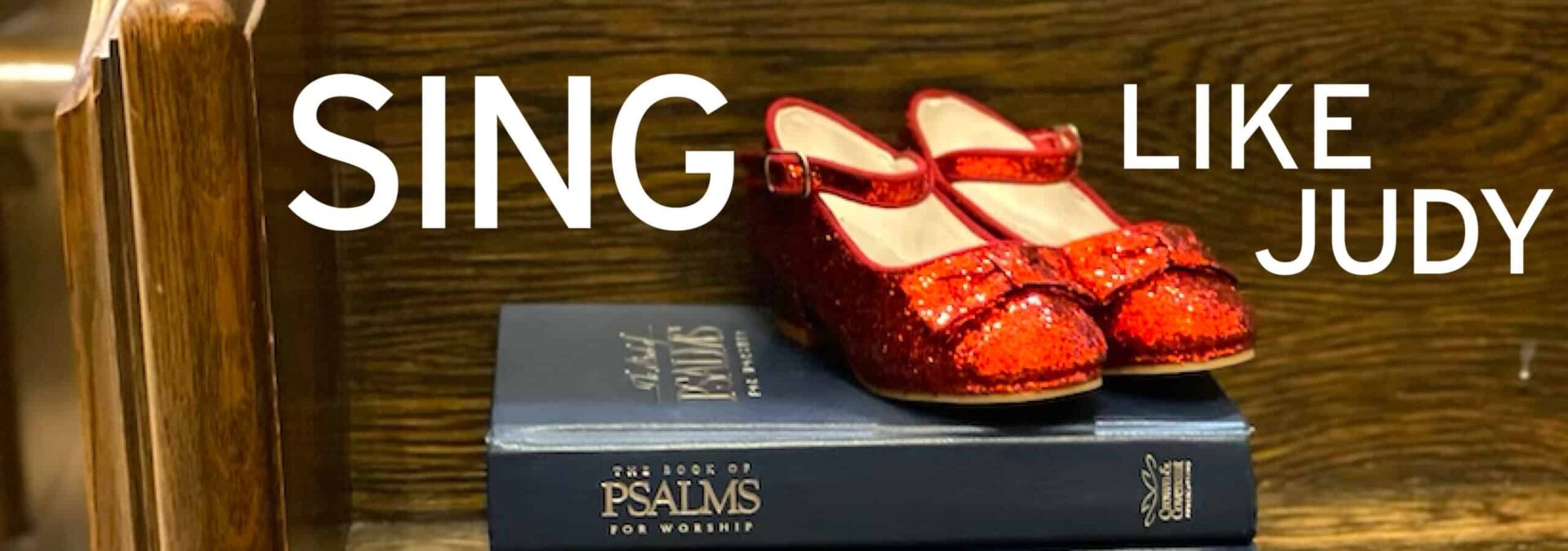This week the blog is sponsored by Crown and Covenant Publications, and the post is written by Nathan Eshelman, pastor of the Orlando Reformed Presbyterian Church in historic downtown Orlando, Florida. He is the author of two Grassmarket Press books: I Have a Confession: The What and Why of the Westminster Confession of Faith (2022) and Worthy: The Worship of God (Fall 2023). Nathan also writes for Gentle Reformation and Meet the Puritans and is a co-host of The Jerusalem Chamber podcast. Nathan is married to Lydia and they have five children. You can order Grassmarket Press books here.
In 1951, Judy Garland sang at the swanky Palace Theatre in New York City week after week with a tedious two-a-day schedule. The house was always packed. As Judy Garland sang her old classics, she ended each show with a medley of Over the Rainbow and Get Happy, two classic Garland numbers.
She had 184 performances at The Palace that year. “Night after night, the result was the same: tears streaked down Judy’s cheeks as she tried to follow her rainbow, and more tears—a rivulet, then a salty waterfall—came from all those watching and hearing her,” wrote historian Gerald Clark in his book on Judy’s life. Tear-filled standing ovations ensued. One newspaper recorded a three minute, eighteen second standing ovation. Her singing was described as a kiss that awakened New York. Contrast the joy of Judy Garland’s vocal expressions with so much of what passes for congregational singing in our churches. This is not a new problem, but one that shows the need for singing with grace in the heart. In the early eighteenth century, one Reformed minister noted the lack of joy and desire in the singing of his country’s congregations. He said:
It amazes me that the godly in the Netherlands have so little desire to sing….Worldly people sing quite a bit, but they sing vain songs which stir up the heart toward vanity and immorality. The godly are, however, generally silent in these parts. The one says… “I have no voice”; the [other] “I do not know any of the melodies”… All of this is, however, not truly the problem, but it is a lack of desire. If the heart were more spiritual and joyous, we would more readily praise the Lord with joyful song and thereby stir up ourselves and others. (The Christian’s Reasonable Service, 4.35.)
Years before, this pastor lamented the lack of hearty praise in his churches—and long before Judy Garland brought The Palace to nightly tears with her joyful song—the Westminster Confession of Faith provided brief instruction on the singing of the Christian Church. The Confession only mentions singing one time:
The reading of the Scriptures with godly fear; the sound preaching and conscionable hearing of the Word, in obedience unto God, with understanding, faith, reverence; singing of psalms with grace in the heart; as also, the due administration and worthy receiving of the sacraments instituted by Christ; are all parts of the ordinary religious worship of God… to be used in a holy and religious manner. (Westminster Confession of Faith, 21.5.)
Did you catch it?
Christians in public worship are not only to sing Psalms, but to sing with grace in their heart.
Judy Garland was a good singer; some would say that’s an understatement; but many would not. Clark noted that “several of her contemporaries also possessed remarkable machines—some better…with wider ranges and more artful technique—yet also failed to raise the blood pressure in the seats out front,” as Clark wrote.
What made Judy different?
I will not argue that she had “grace in her heart” but I do believe that there’s something that the congregational singer can learn from her song.
One of her musical arrangers noted that “she put the words before the music, instead of the other way around, treating the lyrics will all the reverence due them.”
Judy also told an interviewer once, “I mean every word of every song I sing, no matter how many times I’ve sung it before.” The congregational singer needs to sing with grace in the heart, putting words before the tune, meaning every word that is sung. Singing is a response of faith—and the singer must own what he or she sings.
The next lesson that Judy gives to the grace-filled singer is this, according to Clark: “she needed her audience more than it needed her… she was ‘truly, truly, happy’ only when on stage… they were providing her with an identity.” Garland’s entire happiness and identity was wrapped up, not in who she was or in her extravagant lifestyle in Hollywood, but in this simple fact: she lived for her audience and found happiness only there.
As Christians bring praise from week to week, the grace-filled heart must come to terms with the overwhelming fact that we sing praise to a great God who has redeemed us through Christ and gives us an identity—son or daughter, redeemed, loved, made holy, made holy, Spirit-filled—all with hearts that ought to overflow with grace.
Learn that lesson as you praise.
We must put the words before the tune. We must own that which we sing. We must have our identify in the one to whom we sing. Having these three simple truths in mind, we are better equipped to fulfill what The Confession describes as singing psalms with grace in the heart. For you have been redeemed—sing as though it is true!
In the words of Judy Garland:
“Forget your troubles and just Get Happy, you better chase all your cares away Sing Hallelujah, come on, Get Happy, Get ready for the judgment day.”
You are preparing for eternity. Sing like it! For there’s no place like your eternal home.










